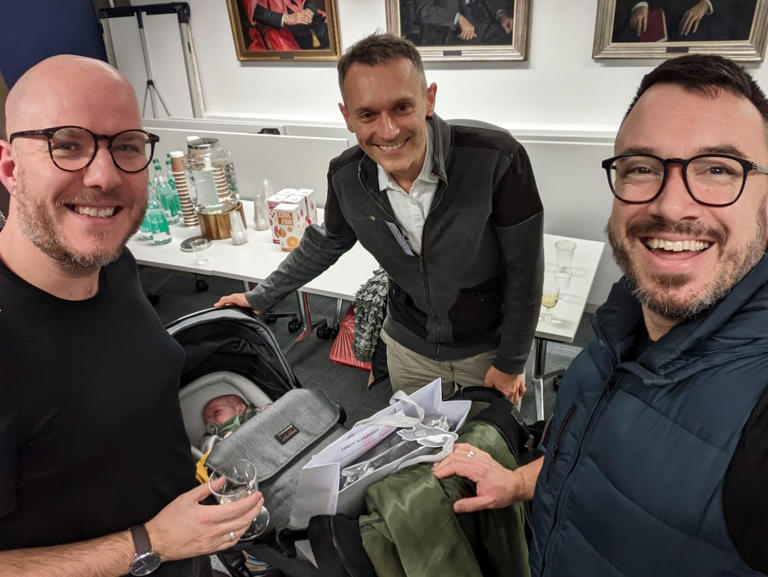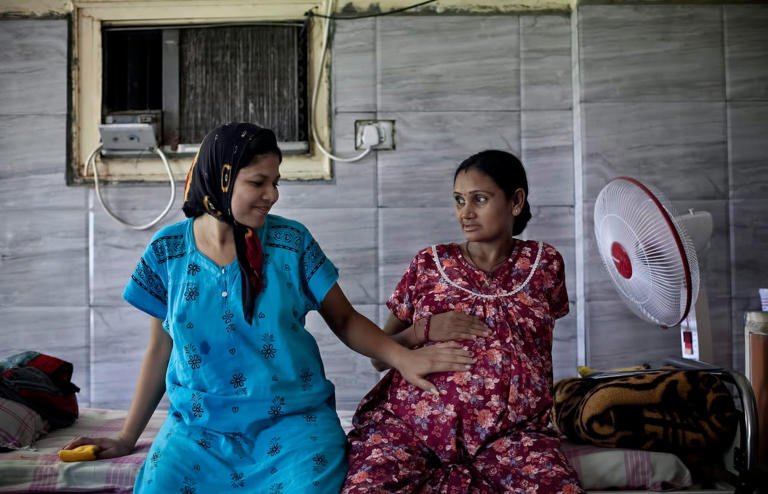Story by John Last • CBC - Jul 3, 2023
For years now, Antonio and Leo have been trying to have a baby. As a gay couple living in Rome, they knew that Italian laws meant adoption was off the table — so beginning in 2021, they started to look into surrogacy as a way to start their family.
Surrogacy is illegal in Italy, too — punishable by up to two years in prison and fines of up to €1 million (about $1.5 million Cdn). Antonio and Leo's names have been changed because the couple fears potential legal repercussions in Italy for even seeking a surrogate.
But for decades, Italian couples have gone abroad to countries like Canada, where surrogacy is legal, to seek fertility treatments.
Not long after beginning their search, Antonio and Leo were approached by a Canadian surrogate who volunteered to carry their baby.
"We really, really like her," said Leo, "and she seems to like us as well. We already feel connected."
But Italy's far-right government had other plans. This month, lawmakers from the leading Fratelli d'Italia (FdI) party tabled a bill to make surrogacy a "universal crime," punishable by steep fines and years in jail no matter where the procedure is done.
Surrogacy is "aimed at destroying … the idea of motherhood," Carolina Varchi, the lawmaker spearheading the proposal, told the Financial Times. Federico Mollicone, another high-ranking FdI member, has called surrogacy a crime that is "even worse than pedophilia."

Lawmakers Riccardo Magi, left, and Benedetto Della Vedova hold placards reading in Italian: 'Parents not criminals' in the low Chamber in Rome during a debate on a bill promoted by the right-wing government that would make it a crime for Italian citizens to use surrogate pregnancy abroad.
(Mauro Scrobogna/LaPresse/The Associated Press)
And Italy is far from alone. Experts say the anti-surrogacy movement is rapidly gaining momentum among the newly empowered far-right parties of Europe — and is bolstering hostile narratives aimed at LGBTQ families that find a broad audience on both sides of the Atlantic.
"They call it 'renting a uterus,' " said Antonio. "They are saying we are enslaving a woman for profit."
Though the law targets all couples seeking surrogates, it is widely understood to be aimed primarily at LGBTQ parents, who Italian Prime Minister Giorgia Meloni has repeatedly accused of undermining society and the traditional family.
"They are saying that Italian gay people cannot have a child — anywhere, anytime," said Leo. "It's a sterilization of gay couples in Italy.
"We feel like we are thrown back half a century and we don't know what to do."
Europe's mixed legal landscape
Despite precedents going back to biblical times, surrogacy is illegal across most of Europe. Just four European Union member states permit the practice — and where it is allowed, it is limited exclusively to residents or to married, heterosexual couples in medical need.
Jenny Gunnarsson Payne, a professor at Södertörn University who studies surrogacy, says much of Europe's opposition to surrogacy stems partly from an unusual coalition between conservative Christians who oppose reproductive technology, and radical feminists who fear it commercializes women's bodies.
"There has been a feminist critique of surrogacy since [in vitro fertilization] was first successfully practiced," she said.
Groups like the International Coalition for the Abolition of Surrogate Motherhood — which brings together radical feminist and lesbian groups from across Europe and North America — are a prime example. Their charter says surrogacy turns women's bodies "into resources for the reproduction industry."
In some ways, these critiques are grounded in real concerns about the surrogacy industry.
"I don't think we should think of the surrogacy industry as innocent," said Gunnarsson Payne. "There is exploitation."
In 2013, India closed its borders to international surrogates after a wave of news coverage painting its surrogacy industry as exploitative of poor women. Many of those same services are now offered in Georgia and Ukraine, where hotlines have been established to provide support to would-be surrogates worried about exploitation.

Italian Prime Minister Giorgia Meloni, seen speaking at a media conference in Rome, in December 2022, has repeatedly accused LGBTQ parents of undermining society and the traditional family.
And Italy is far from alone. Experts say the anti-surrogacy movement is rapidly gaining momentum among the newly empowered far-right parties of Europe — and is bolstering hostile narratives aimed at LGBTQ families that find a broad audience on both sides of the Atlantic.
"They call it 'renting a uterus,' " said Antonio. "They are saying we are enslaving a woman for profit."
Though the law targets all couples seeking surrogates, it is widely understood to be aimed primarily at LGBTQ parents, who Italian Prime Minister Giorgia Meloni has repeatedly accused of undermining society and the traditional family.
"They are saying that Italian gay people cannot have a child — anywhere, anytime," said Leo. "It's a sterilization of gay couples in Italy.
"We feel like we are thrown back half a century and we don't know what to do."
Europe's mixed legal landscape
Despite precedents going back to biblical times, surrogacy is illegal across most of Europe. Just four European Union member states permit the practice — and where it is allowed, it is limited exclusively to residents or to married, heterosexual couples in medical need.
Jenny Gunnarsson Payne, a professor at Södertörn University who studies surrogacy, says much of Europe's opposition to surrogacy stems partly from an unusual coalition between conservative Christians who oppose reproductive technology, and radical feminists who fear it commercializes women's bodies.
"There has been a feminist critique of surrogacy since [in vitro fertilization] was first successfully practiced," she said.
Groups like the International Coalition for the Abolition of Surrogate Motherhood — which brings together radical feminist and lesbian groups from across Europe and North America — are a prime example. Their charter says surrogacy turns women's bodies "into resources for the reproduction industry."
In some ways, these critiques are grounded in real concerns about the surrogacy industry.
"I don't think we should think of the surrogacy industry as innocent," said Gunnarsson Payne. "There is exploitation."
In 2013, India closed its borders to international surrogates after a wave of news coverage painting its surrogacy industry as exploitative of poor women. Many of those same services are now offered in Georgia and Ukraine, where hotlines have been established to provide support to would-be surrogates worried about exploitation.

Italian Prime Minister Giorgia Meloni, seen speaking at a media conference in Rome, in December 2022, has repeatedly accused LGBTQ parents of undermining society and the traditional family.
(Alessandra Tarantino/The Associated Press© Provided by cbc.ca
Allies of the far right
And as alarm about exploitative "birth tourism" has grown, governments have increasingly sought to control what their citizens do abroad and at home.
If Italy's new anti-surrogacy bill passes, it will be the first country in the world to declare surrogacy a universal crime. But its justification is not only that it represents the "commodification and enslavement of the female body," as Italy's family minister, Eugenia Roccella, put it.
For Meloni, surrogacy is at the heart of efforts by what she calls the "LGBT lobby" to normalize the existence of "rainbow families," as those with gay or lesbian parents are known in Italy. A single mother herself, Meloni has nonetheless spoken forcefully about the importance of a "natural family founded on marriage" between a man and a woman.
"There is this narrative about damage to the traditional family, and LGBTQ parents going too far," said Marcin Smietana, an affiliate lecturer with the Reproductive Sociology Research Group at Cambridge University.

Marcin Smietana, centre, with Alan White, right, and his husband Nic Richards, left, and the couple's son, Jago, born through altruistic surrogacy in the United Kingdom. The men were at the Future Directions in Surrogacy Law conference at the Institute of Advanced Legal Studies in London in November 2022.
And as alarm about exploitative "birth tourism" has grown, governments have increasingly sought to control what their citizens do abroad and at home.
If Italy's new anti-surrogacy bill passes, it will be the first country in the world to declare surrogacy a universal crime. But its justification is not only that it represents the "commodification and enslavement of the female body," as Italy's family minister, Eugenia Roccella, put it.
For Meloni, surrogacy is at the heart of efforts by what she calls the "LGBT lobby" to normalize the existence of "rainbow families," as those with gay or lesbian parents are known in Italy. A single mother herself, Meloni has nonetheless spoken forcefully about the importance of a "natural family founded on marriage" between a man and a woman.
"There is this narrative about damage to the traditional family, and LGBTQ parents going too far," said Marcin Smietana, an affiliate lecturer with the Reproductive Sociology Research Group at Cambridge University.

Marcin Smietana, centre, with Alan White, right, and his husband Nic Richards, left, and the couple's son, Jago, born through altruistic surrogacy in the United Kingdom. The men were at the Future Directions in Surrogacy Law conference at the Institute of Advanced Legal Studies in London in November 2022.
(Submitted by Marcin Smietana )
These narratives have also gained hold in Poland, Spain and even progressive Sweden, where politicians who have taken similar lines on surrogacy and LGBTQ+ parental rights have been met with broad support.
"There is this shift in political consensus that has really happened quickly," said Gunnarsson Payne. "It feels like the '90s was back in Sweden — increased racism, right wing populism and now, these debates [about gender]."
Altruistic surrogacy
But this dark view of surrogacy is not the whole picture.
Even in India, where the practice was long portrayed as exploitative, interviews of surrogate mothers by scholars like Sharmila Rudrappa show that many found the experience "life-affirming" and even empowering, within the context of an economy rife with abusive industries.

On Nov. 2, 2015, Bhagwati Chauhan, left, who had recently given birth to a Canadian couple's child, touches the nine-month pregnant belly of Chandrika Makwana, who was carrying twins for an American couple, at the Akanksha Clinic in Anand, India. Not long after, he Indian government banned surrogate services for foreigners and ordered fertility clinics to stop hiring Indian women to bear children for them.
These narratives have also gained hold in Poland, Spain and even progressive Sweden, where politicians who have taken similar lines on surrogacy and LGBTQ+ parental rights have been met with broad support.
"There is this shift in political consensus that has really happened quickly," said Gunnarsson Payne. "It feels like the '90s was back in Sweden — increased racism, right wing populism and now, these debates [about gender]."
Altruistic surrogacy
But this dark view of surrogacy is not the whole picture.
Even in India, where the practice was long portrayed as exploitative, interviews of surrogate mothers by scholars like Sharmila Rudrappa show that many found the experience "life-affirming" and even empowering, within the context of an economy rife with abusive industries.

On Nov. 2, 2015, Bhagwati Chauhan, left, who had recently given birth to a Canadian couple's child, touches the nine-month pregnant belly of Chandrika Makwana, who was carrying twins for an American couple, at the Akanksha Clinic in Anand, India. Not long after, he Indian government banned surrogate services for foreigners and ordered fertility clinics to stop hiring Indian women to bear children for them.
(Allison Joyce/The Associated Press)
"The overarching popular narrative of surrogate mothers as browbeaten, uninformed, easily duped villagers helplessly caught up in the web of global intimate industries was simply not true," Rudrappa wrote.
In Canada, where Antonio and Leo's surrogate is now awaiting some clarity on whether they can legally proceed, commercial surrogacy is still illegal. Here, surrogates must volunteer on an "altruistic" basis, and can only be reimbursed for expenses directly related to their pregnancy.
Angela Truppe, whose agency Canadian Surrogacy Community has helped global families find surrogates in Canada for the last six years, says many of her clients come from places like Italy, where surrogacy is criminalized. Of her 20 current clients, eight are international.
It hasn't escaped Truppe's notice that surrogacy has become a hot-button issue. LGBTQ families are a minority of those seeking surrogates, she says, but their push for rights has made surrogacy more visible.

Angela Truppe, whose agency Canadian Surrogacy Community has helped global families find surrogates in Canada for the last six years, says many of her clients come from places like Italy, where surrogacy is criminalized.
"The overarching popular narrative of surrogate mothers as browbeaten, uninformed, easily duped villagers helplessly caught up in the web of global intimate industries was simply not true," Rudrappa wrote.
In Canada, where Antonio and Leo's surrogate is now awaiting some clarity on whether they can legally proceed, commercial surrogacy is still illegal. Here, surrogates must volunteer on an "altruistic" basis, and can only be reimbursed for expenses directly related to their pregnancy.
Angela Truppe, whose agency Canadian Surrogacy Community has helped global families find surrogates in Canada for the last six years, says many of her clients come from places like Italy, where surrogacy is criminalized. Of her 20 current clients, eight are international.
It hasn't escaped Truppe's notice that surrogacy has become a hot-button issue. LGBTQ families are a minority of those seeking surrogates, she says, but their push for rights has made surrogacy more visible.

Angela Truppe, whose agency Canadian Surrogacy Community has helped global families find surrogates in Canada for the last six years, says many of her clients come from places like Italy, where surrogacy is criminalized.
(Submitted by Angela Truppe)
"Traditionally, the couples that are struggling with infertility, they're not yelling it out loud," she said. "The LGBTQ community, they don't hide from it."
Unifying the right
For now, the issue of surrogacy is more likely to divide the far right in Canada and the U.S. than unite it with the feminist left.
Smietana, of the Reproductive Sociology Research Group, notes that in North America, unlike Europe, surrogacy is usually associated with reproductive freedom. In some U.S. states, this extends to support for commercial surrogacy, today a multibillion-dollar industry.
Among voices on the political right, the issue is still a sensitive one. When Dave Rubin, a conservative commentator for the right-wing BlazeTV network, announced he would have two children via surrogates, he was met with outrage from religious conservatives.
Yet there are signs that growing hostility to trans rights may unify the right against surrogacy. Matt Walsh, a podcast host known for his anti-trans commentary, has voiced support for anti-surrogate feminists and called surrogacy "a moral crime against both women and children."
In Canada, efforts to support surrogacy have met with similar attacks from anti-abortion groups like the Campaign Life Coalition, which said on its website that a 2022 tax break for surrogacy "used tax dollars to advance the works of darkness across our nation."

Rome Mayor Roberto Gualtieri, wearing a sash with the colours of the Italian flag, joins the LGBTQ+ Pride parade in Rome on June 10. Gualatieri, a centre-left politician, was among those who defied Italy's order to end the registration of both same-sex parents on children's birth certificates.
"Traditionally, the couples that are struggling with infertility, they're not yelling it out loud," she said. "The LGBTQ community, they don't hide from it."
Unifying the right
For now, the issue of surrogacy is more likely to divide the far right in Canada and the U.S. than unite it with the feminist left.
Smietana, of the Reproductive Sociology Research Group, notes that in North America, unlike Europe, surrogacy is usually associated with reproductive freedom. In some U.S. states, this extends to support for commercial surrogacy, today a multibillion-dollar industry.
Among voices on the political right, the issue is still a sensitive one. When Dave Rubin, a conservative commentator for the right-wing BlazeTV network, announced he would have two children via surrogates, he was met with outrage from religious conservatives.
Yet there are signs that growing hostility to trans rights may unify the right against surrogacy. Matt Walsh, a podcast host known for his anti-trans commentary, has voiced support for anti-surrogate feminists and called surrogacy "a moral crime against both women and children."
In Canada, efforts to support surrogacy have met with similar attacks from anti-abortion groups like the Campaign Life Coalition, which said on its website that a 2022 tax break for surrogacy "used tax dollars to advance the works of darkness across our nation."

Rome Mayor Roberto Gualtieri, wearing a sash with the colours of the Italian flag, joins the LGBTQ+ Pride parade in Rome on June 10. Gualatieri, a centre-left politician, was among those who defied Italy's order to end the registration of both same-sex parents on children's birth certificates.
(Mauro Scrobogna/La Presse/The Associated Press)
Experts like Smietana and Gunnarsson Payne suspect that harsh bans on surrogacy, like the one proposed in Italy, are more likely to drive the practice underground and increase emigration than end surrogacy altogether. Italy is already suffering a demographic crisis from population drain and one of the lowest birth rates in Europe.
Meanwhile, Antonio and Leo may have to wait as long as a decade to see Meloni's new law challenged and overturned in European courts. They can't expect their surrogate to wait.
"For the very first time in our lives, we feel like we are being discriminated against, as gay men," Antonio said.
"I never even got a parking ticket. And now I'm facing three years in prison, just for wanting to be a parent."
Experts like Smietana and Gunnarsson Payne suspect that harsh bans on surrogacy, like the one proposed in Italy, are more likely to drive the practice underground and increase emigration than end surrogacy altogether. Italy is already suffering a demographic crisis from population drain and one of the lowest birth rates in Europe.
Meanwhile, Antonio and Leo may have to wait as long as a decade to see Meloni's new law challenged and overturned in European courts. They can't expect their surrogate to wait.
"For the very first time in our lives, we feel like we are being discriminated against, as gay men," Antonio said.
"I never even got a parking ticket. And now I'm facing three years in prison, just for wanting to be a parent."
No comments:
Post a Comment